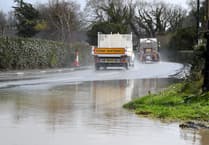There’s a lot of advice in the media at the moment about how to stave off the lockdown blues, especially this week which started off with ’Blue Monday’ - with mid-winter mornings that seem darker than ever, and Christmas credit card bills arriving on our doormats.
As part of a lockdown routine many people seem to be taking a daily break from home schooling and working from home by going out on family walks, in the well-founded belief that fresh air and a connection with the natural world are the best tonics.
And this is good news, too, for ducks.
Why? Because this is traditionally a time of year when there are fewer visitors to our parks and glens, and so the ducks that live in them are fed less of the bread and treats that they get in the warmer months.
This is also a time of year when there is less vegetation for them to eat, and some starve to death. More people taking walks should result in more ducks being fed.
The ’ban the bread’ campaign, which was started by a bird feed company several years ago, has now largely been discredited.
The Royal Society for the Protection of Birds (RSPB) says it’s OK to feed ducks, and other water birds like swans, small amounts of bread (as long as it’s not mouldy) - as much as the birds can eat in one ’sitting’ so that excess bread doesn’t pollute the water.
The RSPB also advises that we should try to vary what we feed ducks and swans so that they get the necessary minerals and vitamins in their diet.
Sweetcorn, porridge oats, defrosted frozen peas and bird seed are all excellent alternatives.
So, before you set out for your daily stroll, maybe fill a coat pocket with some of these tasty treats and take a detour to your local pond to feed the resident birds there.
In the spring, however, feeding bread to ducks can have a detrimental effect.
The ducklings don’t develop the foraging skills they need to survive, and while the bread gives them energy it doesn’t provide them with a balanced diet.
An added risk is that a mother duck coming out to feed on bread will have her ducklings in tow, which puts them in greater danger of being ’picked off’ by hungry gulls.
Feeding our garden birds is also vitally important at this time of year.
Harsh winters have an impact on bird numbers, and small birds suffer particularly badly. And the benefits of feeding garden birds are mutual - observing birds in our gardens and back yards can have a positive impact on our mental health.
A recent study by academics, led by a team from Exeter University, found that lower levels of depression, anxiety and stress were associated with the number of wild birds people saw in the day.
Socio-economic and demographic factors did not influence the overall findings, nor did the particular species of bird observed, and it seems that seeing any type of bird makes people feel relaxed and closer to nature.
For many of us feeding ducks and swans in our local park, or placing scraps on a table for garden birds to find, are among our first memories of interacting with nature in the wild.
Encouraging our children to make bird feeding part of their lockdown experience will help their wellbeing in the short term, and perhaps give them a life-long mental health coping strategy for the future.





Comments
This article has no comments yet. Be the first to leave a comment.